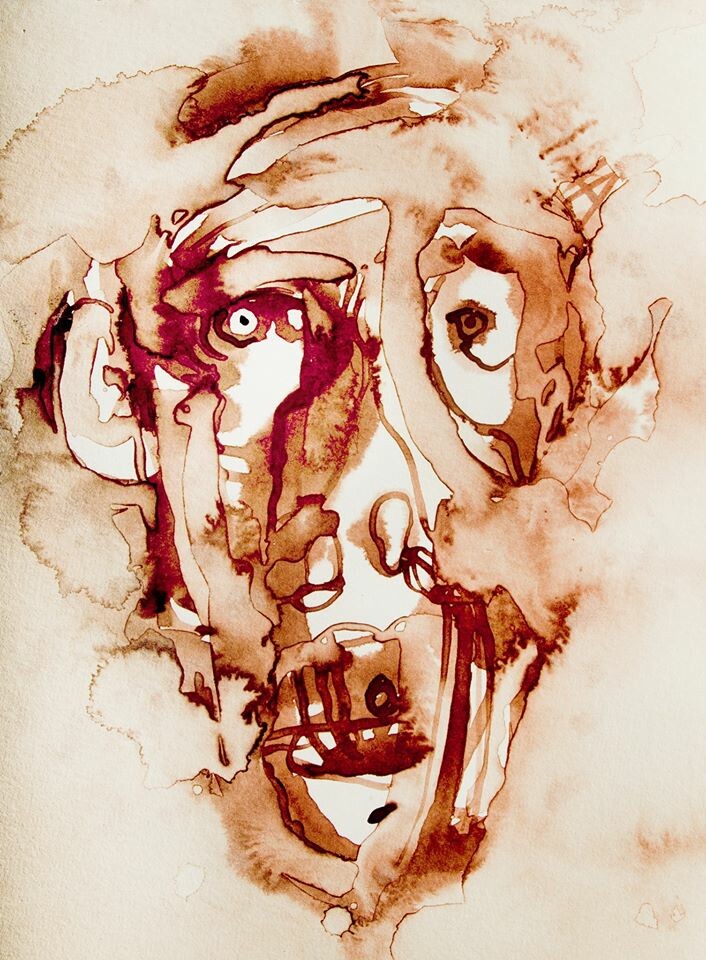19:00
- Lita Poliakova
- Eintritt frei

The series B(lo)ody focuses on the pain and suffering, which are inevitably encrypted in the cycles of life and caused by the flesh and social interactions.
In my view, a fleshy substance is an integral part of the human being and, in a deeper meaning, becomes an intimate, vulnerable issue.
The flesh is something global, mystic, over-interpretable. The blood represents the essence of flesh materiality. Whatever social or personal issues the mind falls in - a body is involved, it faces an attack, reacts, can be transformed or even destroyed. The notion of interaction is always present, nevertheless each of us is inside our own sensations.
The image causes an internal frustration, reminds the viewer about mortality and creates emotional disbalance to those who cannot accept the essence of their being. I paint emotions, inner conflicts that are imprinted on the face; I visualize suffering to
create the first step on the way to acceptance of our traumas.
The art therapy deals with the trauma through a non-linguistic communication since the traumatic experience is claimed to be identified as nonverbal. The self-transformation starts from symbolizing, depicting, shaping emotional wounds and reoccurring distressing sensations through a ceremony and behavioral techniques. According to a drama therapist Dr. D. R. Johnson (Johnson, D. R. The Arts in Psychotherapy, 1987,
14(1), 7–13) there are three major steps working towards overcoming traumatic experiences: accessing painful memories, their re-examination and conceptualization, reintegration and restoring identity.
Creative art practices appear to be an alternative language since overcoming the trauma by processing the pain verbally is not as effective as motor and motion activities, visualizing suppressed feelings and safe imaginary spaces. In my view the art
is not only decorative or serving a representation of nonscientific encryption of the meaning, but also can be a healing tool for the artist and others as well.
In my view, a fleshy substance is an integral part of the human being and, in a deeper meaning, becomes an intimate, vulnerable issue.
The flesh is something global, mystic, over-interpretable. The blood represents the essence of flesh materiality. Whatever social or personal issues the mind falls in - a body is involved, it faces an attack, reacts, can be transformed or even destroyed. The notion of interaction is always present, nevertheless each of us is inside our own sensations.
The image causes an internal frustration, reminds the viewer about mortality and creates emotional disbalance to those who cannot accept the essence of their being. I paint emotions, inner conflicts that are imprinted on the face; I visualize suffering to
create the first step on the way to acceptance of our traumas.
The art therapy deals with the trauma through a non-linguistic communication since the traumatic experience is claimed to be identified as nonverbal. The self-transformation starts from symbolizing, depicting, shaping emotional wounds and reoccurring distressing sensations through a ceremony and behavioral techniques. According to a drama therapist Dr. D. R. Johnson (Johnson, D. R. The Arts in Psychotherapy, 1987,
14(1), 7–13) there are three major steps working towards overcoming traumatic experiences: accessing painful memories, their re-examination and conceptualization, reintegration and restoring identity.
Creative art practices appear to be an alternative language since overcoming the trauma by processing the pain verbally is not as effective as motor and motion activities, visualizing suppressed feelings and safe imaginary spaces. In my view the art
is not only decorative or serving a representation of nonscientific encryption of the meaning, but also can be a healing tool for the artist and others as well.






